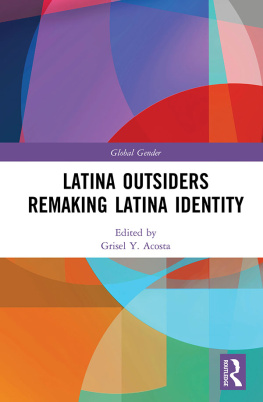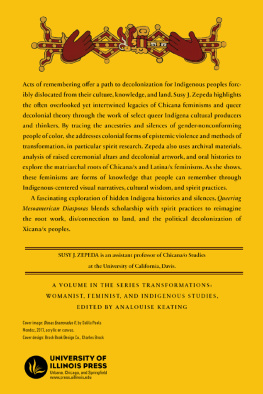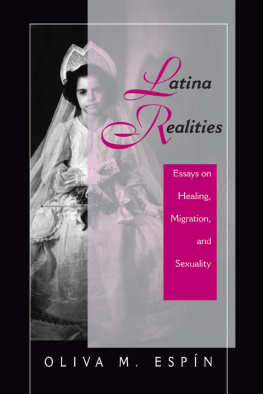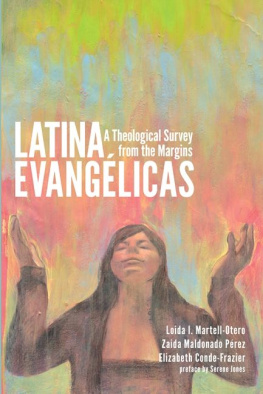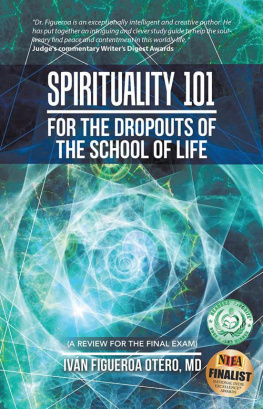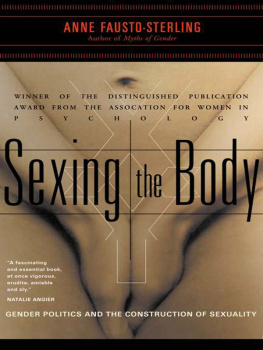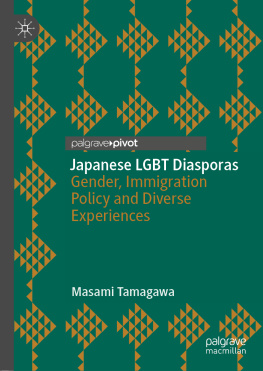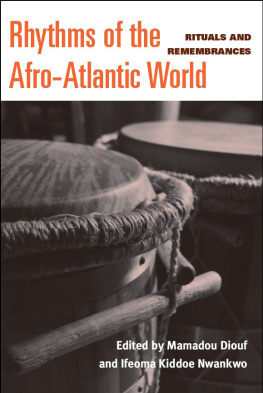Yemoja
Yemoja
Gender, Sexuality, and Creativity in the
Latina/o and Afro-Atlantic Diasporas
Edited by
SOLIMAR OTERO
and
TOYIN FALOLA
Cover image, Adenike of Lagos, Arturo Lindsay, 2003. Digital print, 24" x 21", in the collection of the artist.
Published by State University of New York Press, Albany
2013 State University of New York
All rights reserved
Printed in the United States of America
No part of this book may be used or reproduced in any manner whatsoever without written permission. No part of this book may be stored in a retrieval system or transmitted in any form or by any means including electronic, electrostatic, magnetic tape, mechanical, photocopying, recording, or otherwise without the prior permission in writing of the publisher.
For information, contact State University of New York Press, Albany, NY
www.sunypress.edu
Production by Eileen Nizer
Marketing by Anne M. Valentine
Library of Congress Cataloging-in-Publication Data
Yemoja : gender, sexuality, and creativity in the Latina/o and Afro-Atlantic
diasporas / edited by Solimar Otero and Toyin Falola.
p. cm.
Includes bibliographical references and index.
ISBN 978-1-4384-4799-5 (hardcover : alk. paper)
1. Yemaja (Yoruba deity) 2. Mother goddesses. 3. Afro-Caribbean cults. 4. Cultural fusion and the arts. 5. African diaspora in art. 6. Goddesses in art. 7. Orishas in art. 8. Sex in art. I. Otero, Solimar. II. Falola, Toyin.
BL2480.Y6Y46 2013
299.61211dc23
2012043678
10 9 8 7 6 5 4 3 2 1
To our mothers, especially Maria Julia Melchor
Yemay Asesu, Asesu Yemay
Yemay Asesu, Asesu Yemay
Yemay Olodo, Olodo Yemay
Yemay Olodo, Olodo Yemay
Traditional Afro-Cuban song for Yemay
Contents
P ART 1
Y EMOJA , G ENDER, AND S EXUALITY
Chapter 1
Nobodys Mammy: Yemay as Fierce Foremother in Afro-Cuban Religions
Chapter 2
Yemays Duck: Irony, Ambivalence, and the Effeminate Male Subject in Cuban Santera
Chapter 3
Yemay y Ochn: Queering the Vernacular Logics of the Waters
Chapter 4
A Different Kind of Sweetness: Yemay in Afro-Cuban Religion
Chapter 5
Yemoja: An Introduction to the Divine Mother and Water Goddess
P ART 2
Y EMOJA S A ESTHETICS : C REATIVE E XPRESSION IN D IASPORA
Chapter 6
Yemaya Blew That Wire Fence Down: Invoking African Spiritualities in Gloria Anzaldas Borderlands/La Frontera: The New Mestiza and the Mural Art of Juana Alicia
Chapter 7
Dancing Ach with Yemaya in My Life and in My Art: An Artist Statement
Chapter 8
What the Water Brings and Takes Away: The Work of Mara Magdalena Campos Pons
Chapter 9
The Sea Never Dies: Yemoja: The Infinitely Flowing Mother Force of Africana Literature and Cinema
Chapter 10
A Sonic Portrait with Photos of Salvadors Iemanj Festival
Chapter 11
Yemay Offering a Pearl of Wisdom: An Artist Statement
Illustrations and Other Media
Cover image, Adenike of Lagos, Arturo Lindsay, 2003. Digital print, 24" x 21", in the collection of the artist.
Color Gallery follows page 186
Acknowledgments
Many people and organizations helped to make this project a reality. Many thanks for the support and feedback received from the Harvard Divinity Schools Womens Studies in Religion program, especially Ann Braude, who sponsored some of the research in Cuba presented in this book. We are grateful as well for the support received from the University of Texas at Austin. We also would like to acknowledge the support received from Dean Gaines Foster, from the College of Humanities and Social Sciences at Louisiana State University. Thank you also to the chair of the Department of English at LSU, Rick Moreland, who enthusiastically believed in this project. We give much thanks to all at the Womens and Gender Studies (WGS) program at LSU. WGS provided necessary support for completing this project, in addition to offering an important intellectual venue for working through the main components of this work. LSUs programs in Louisiana and Caribbean Studies and Atlantic Studies were both extremely helpful and supportive of the collaborative endeavors presented in this book.
There are also many colleagues whose feedback was crucial to developing our vision in the anthology. We are grateful to Aisha Beliso-De Jess for her thoughtful comments in formulating the early stages of this project. Lucinda Romberg also read early versions of the work and provided much insight. We also thank Norma Cant and Katey Borland for their useful readings and responses. LSU colleagues Bill Boelhower, Benjamin Kahn, Lara Glenum, Pallavi Rastogi, Carolyn Ware, Rosan Jordan, and Frank De Caro graciously commented on the project in ways that greatly improved our scope and focus. We are grateful to Arturo Lindsay, Juana Alicia, Jamie Davidson, Nelson Eubanks, and Erin Colcord for graciously allowing us to reproduce the powerful artwork and photography found in this book. We especially want to thank the spiritual communities in Africa, Cuba, Brazil, Panama, Puerto Rico, and the United States who generously allowed their wisdom and knowledge to inform and shape the research presented in this book. Finally, we would like to recognize our families and loved onesEric Mayer-Garca, Rai Otero, Raymond M. Otero, Robert and Blanca Alvarez, and Maria Julia Melchorfor their moral support and belief in the volume. A dupe, nuestras gracias.
Note on Terminology and Orthography
Some of the chapters in this book use the diacritical marks that express Yoruba tones and consonances. Yoruba is a tonal language that moved across the Atlantic into contexts where Spanish, Portuguese, and American dialects of English incorporated the language within their own phonetic structures. The differences in orthography reflected in the chapters that follow indicate these shifts in language use. We use the spelling Yemoja in the introduction of the volume for clarity. Wherever appropriate, we keep the authors intended usage of Yoruba terminology. In this manner, the names Yemay, Iemanj, and Yemoja relate to the same deity in different cultural and linguistic contexts.
Introduction
Introducing Yemoja
Solimar Otero and Toyin Falola
Mother I need
mother I need
mother I need your blackness now
as the august earth needs rain.
Audre Lorde, From the House of Yemanj
Yemay es Reina Universal porque es el Agua, la salada y la dulce, la Mar, la Madre de todo lo creado / Yemay is the Universal Queen because she is Water, salty and sweet, the Sea, the Mother of all creation.
Oba Olo Ocha as quoted in Lydia Cabreras Yemay y Ochn.
In the above quotes, poet Audre Lorde and folklorist Lydia Cabrera write about Yemoja as an eternal mother whose womb, like water, makes life possible. They also relate in their works the shifting and fluid nature of Yemoja and the divinity in her manifestations and in the lives of her devotees. This book, Yemoja: Gender, Sexuality, and Creativity in the Latina/o and Afro-Atlantic Diasporas,


